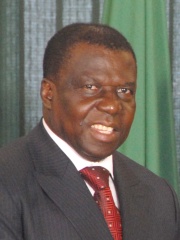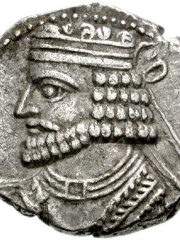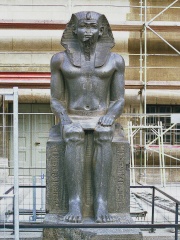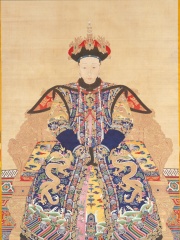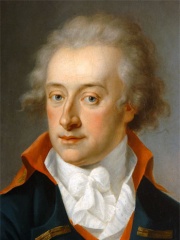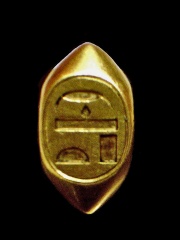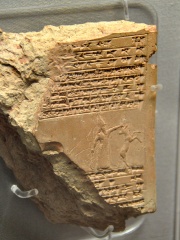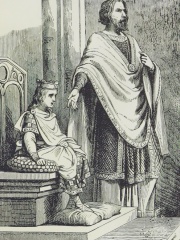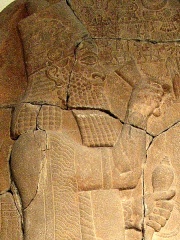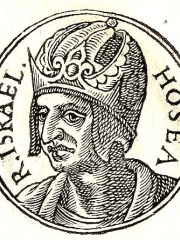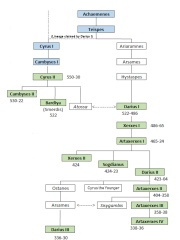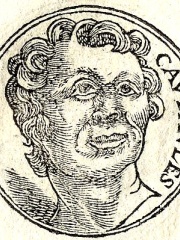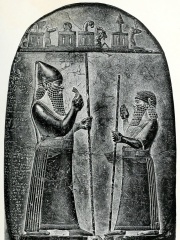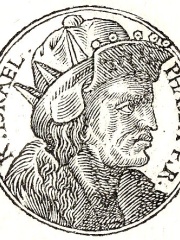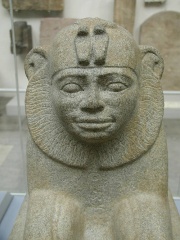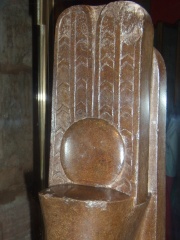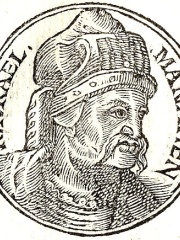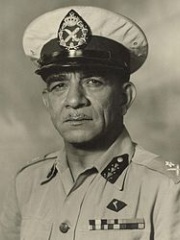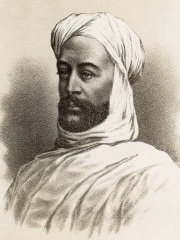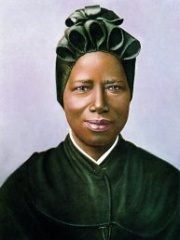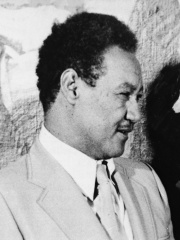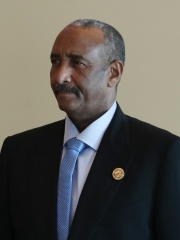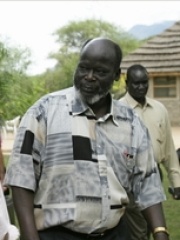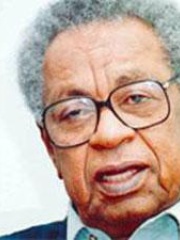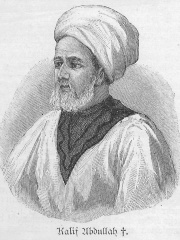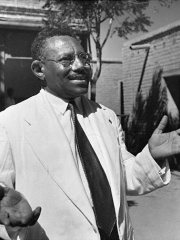Politician
Piye
800 BC - 716 BC
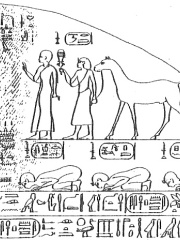
 Piye
Piye
Piye (also interpreted as Pānkhi, Piankhy, Paiānkhi, Piānkhi, or Paānkhi) was an ancient Kushite king and founder of the Twenty-fifth Dynasty of Egypt, who ruled Egypt from 744–714 BC. He ruled from the city of Napata, located deep in Nubia, modern-day Sudan. Read more on Wikipedia
His biography is available in 44 different languages on Wikipedia (up from 43 in 2024). Piye is the 3,123rd most popular politician (down from 2,939th in 2024), the 5th most popular biography from Sudan and the 3rd most popular Sudanese Politician.
Piye is most famous for his conquest of Egypt.
Memorability Metrics
Page views of Piye by language
Among Politicians
Among politicians, Piye ranks 3,123 out of 19,576. Before him are Æthelfrith, João Bernardo Vieira, Vologases I of Parthia, Gazi Husrev-beg, Amenemhat II, and Empress Xiaoyichun. After him are Aloys I, Prince of Liechtenstein, Ahhotep I, Gordon Brown, Ashur-nadin-shumi, Princess Marie Louise of Schleswig-Holstein, and Clovis IV.
Most Popular Politicians in Wikipedia
Go to all RankingsÆthelfrith
600 - 616
HPI: 69.50
Rank: 3,118
João Bernardo Vieira
1939 - 2009
HPI: 69.49
Rank: 3,119
Vologases I of Parthia
1 - 78
HPI: 69.49
Rank: 3,120
Gazi Husrev-beg
1480 - 1541
HPI: 69.49
Rank: 3,121
Amenemhat II
1950 BC - 1885 BC
HPI: 69.49
Rank: 3,122
Empress Xiaoyichun
1727 - 1775
HPI: 69.49
Rank: 3,123
Piye
800 BC - 716 BC
HPI: 69.49
Rank: 3,124
Aloys I, Prince of Liechtenstein
1759 - 1805
HPI: 69.48
Rank: 3,125
Ahhotep I
1560 BC - 1530 BC
HPI: 69.47
Rank: 3,126
Gordon Brown
1951 - Present
HPI: 69.47
Rank: 3,127
Ashur-nadin-shumi
800 BC - 694 BC
HPI: 69.47
Rank: 3,128
Princess Marie Louise of Schleswig-Holstein
1872 - 1956
HPI: 69.47
Rank: 3,129
Clovis IV
677 - 695
HPI: 69.47
Rank: 3,130
Contemporaries
Among people born in 800 BC, Piye ranks 14. Before him are Manasseh of Judah, Esarhaddon, Hoshea, Achaemenes, Titus Tatius, and Candaules. After him are Ashur-nadin-shumi, Marduk-apla-iddina II, Pekahiah, Taharqa, Tantamani, and Menahem. Among people deceased in 716 BC, Piye ranks 1.
Others Born in 800 BC
Go to all RankingsManasseh of Judah
POLITICIAN
800 BC - 642 BC
HPI: 73.22
Rank: 8
Esarhaddon
POLITICIAN
800 BC - 669 BC
HPI: 73.21
Rank: 9
Hoshea
POLITICIAN
800 BC - 800 BC
HPI: 72.91
Rank: 10
Achaemenes
POLITICIAN
800 BC - 700 BC
HPI: 72.65
Rank: 11
Titus Tatius
POLITICIAN
800 BC - 800 BC
HPI: 72.30
Rank: 12
Candaules
POLITICIAN
800 BC - 760 BC
HPI: 69.72
Rank: 13
Piye
POLITICIAN
800 BC - 716 BC
HPI: 69.49
Rank: 14
Ashur-nadin-shumi
POLITICIAN
800 BC - 694 BC
HPI: 69.47
Rank: 15
Marduk-apla-iddina II
POLITICIAN
800 BC - 760 BC
HPI: 68.36
Rank: 16
Pekahiah
POLITICIAN
800 BC - 760 BC
HPI: 68.26
Rank: 17
Taharqa
POLITICIAN
800 BC - 664 BC
HPI: 68.24
Rank: 18
Tantamani
POLITICIAN
800 BC - 653 BC
HPI: 67.81
Rank: 19
Menahem
POLITICIAN
800 BC - 760 BC
HPI: 67.76
Rank: 20
Others Deceased in 716 BC
Go to all RankingsIn Sudan
Among people born in Sudan, Piye ranks 5 out of 38. Before him are Omar al-Bashir (1944), Luqman (-1100), Mohamed Naguib (1901), and Muhammad Ahmad (1844). After him are Josephine Bakhita (1868), Gaafar Nimeiry (1930), Abdel Fattah al-Burhan (1960), John Garang (1945), Osman Hussein (1951), Abdalla Hamdok (1956), and Tayeb Salih (1929).
Others born in Sudan
Go to all RankingsOmar al-Bashir
POLITICIAN
1944 - Present
HPI: 79.00
Rank: 1
Luqman
WRITER
1100 BC - 1769
HPI: 74.76
Rank: 2
Mohamed Naguib
POLITICIAN
1901 - 1984
HPI: 74.48
Rank: 3
Muhammad Ahmad
RELIGIOUS FIGURE
1844 - 1885
HPI: 70.35
Rank: 4
Piye
POLITICIAN
800 BC - 716 BC
HPI: 69.49
Rank: 5
Josephine Bakhita
RELIGIOUS FIGURE
1868 - 1947
HPI: 68.83
Rank: 6
Gaafar Nimeiry
POLITICIAN
1930 - 2009
HPI: 68.38
Rank: 7
Abdel Fattah al-Burhan
POLITICIAN
1960 - Present
HPI: 67.61
Rank: 8
John Garang
POLITICIAN
1945 - 2005
HPI: 65.06
Rank: 9
Osman Hussein
POLITICIAN
1951 - Present
HPI: 63.27
Rank: 10
Abdalla Hamdok
POLITICIAN
1956 - Present
HPI: 62.30
Rank: 11
Tayeb Salih
WRITER
1929 - 2009
HPI: 62.20
Rank: 12
Among Politicians In Sudan
Among politicians born in Sudan, Piye ranks 3. Before him are Omar al-Bashir (1944), and Mohamed Naguib (1901). After him are Gaafar Nimeiry (1930), Abdel Fattah al-Burhan (1960), John Garang (1945), Osman Hussein (1951), Abdalla Hamdok (1956), Ibrahim Abboud (1900), Hassan Al-Turabi (1932), Abdallahi ibn Muhammad (1846), and Ismail al-Azhari (1901).
Omar al-Bashir
1944 - Present
HPI: 79.00
Rank: 1
Mohamed Naguib
1901 - 1984
HPI: 74.48
Rank: 2
Piye
800 BC - 716 BC
HPI: 69.49
Rank: 3
Gaafar Nimeiry
1930 - 2009
HPI: 68.38
Rank: 4
Abdel Fattah al-Burhan
1960 - Present
HPI: 67.61
Rank: 5
John Garang
1945 - 2005
HPI: 65.06
Rank: 6
Osman Hussein
1951 - Present
HPI: 63.27
Rank: 7
Abdalla Hamdok
1956 - Present
HPI: 62.30
Rank: 8
Ibrahim Abboud
1900 - 1983
HPI: 61.56
Rank: 9
Hassan Al-Turabi
1932 - 2016
HPI: 61.48
Rank: 10
Abdallahi ibn Muhammad
1846 - 1899
HPI: 61.38
Rank: 11
Ismail al-Azhari
1901 - 1969
HPI: 60.74
Rank: 12

